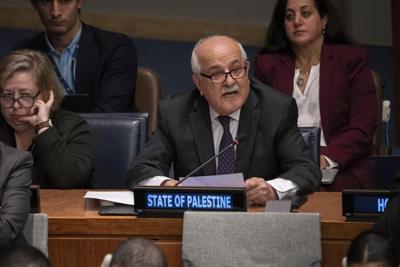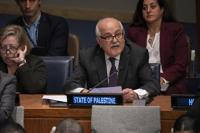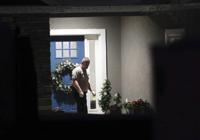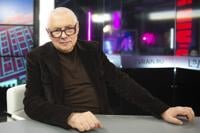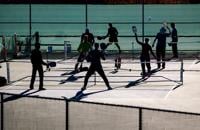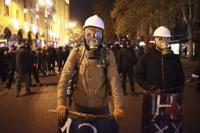UNITED NATIONS (AP) ÔÇö The U.N. General Assembly has asked the U.N.ÔÇÖs highest judicial body to give its opinion on the legality of Israeli policies in the occupied West Bank and east Jerusalem.
The Assembly voted by a wide margin, but with over 50 countries abstaining, on Friday evening to , a request promoted by the Palestinians and opposed vehemently by Israel.
While the courtÔÇÖs rulings are not binding, they influence international opinion. It last addressed the conflict in 2004, when the Assembly asked it to consider the legality of an Israeli-built separation barrier.
Palestinian Ambassador Riyad Mansour thanked countries that backed the measure.
ÔÇťWe trust that regardless of your vote today, if you believe in international law and peace, you will uphold the opinion of the International Court of Justice, when delivered,ÔÇŁ Mansour said, going on to urge countries to ÔÇťstand upÔÇŁ to
Israel didn't speak at the Assembly, which voted during the Jewish Sabbath. In a written statement beforehand, Ambassador Gilad Erdan called the measure ÔÇťoutrageous,ÔÇŁ the U.N. ÔÇťmorally bankrupt and politicizedÔÇŁ and any potential decision from the court ÔÇťcompletely illegitimate.ÔÇŁ
Israel captured the West Bank, east Jerusalem and Gaza Strip in the 1967 Mideast war. The Palestinians seek all three areas for an independent state.
Israel considers the West Bank to be disputed territory and has built dozens of settlements that are now home to roughly 500,000 Jewish settlers.
It also has annexed east Jerusalem and considers the entire city to be its capital. An additional 200,000 Israelis live in settlements built in east Jerusalem that Israel considers to be neighborhoods of its capital. Palestinian residents of the city face systematic discrimination, making it difficult for them to build new homes or expand existing ones.
The international community overwhelmingly considers the settlements to be illegal. IsraelÔÇÖs annexation of east Jerusalem, home to the cityÔÇÖs most sensitive holy sites, also is not internationally recognized.
Israel withdrew from Gaza in 2005. Two years later, the Hamas militant group seized control of the territory from the forces of internationally recognized President Mahmoud Abbas.
FridayÔÇÖs resolution asked the International Court of Justice, commonly known as the world court, to issue an advisory opinion on the legal consequences of
It also asked the court to look at the legal consequences of Israeli measures it said are ÔÇťaimed at altering the demographic composition, character and status of the Holy City of Jerusalem.ÔÇŁ
And it asks for an opinion on how all Israeli policies affect the legal status of its occupation, ÔÇťand what are the legal consequences that arise for all states and the United Nations from this status.ÔÇŁ
The vote was 87-26, with 53 abstentions. It followed approvals of the draft resolution in the assemblyÔÇÖs budget committee earlier Friday and in the Special Political and Decolonization Committee on Nov. 11.
Israel carried out widespread behind-the-scenes lobbying efforts against the measure and decried the Assembly for voting after the Sabbath began Friday evening.
Ahead of the vote, outgoing Prime Minister Yair Lapid personally contacted about 60 world leaders while figurehead President Isaac Herzog spoke to many counterparts, according to an Israeli diplomatic official who spoke on condition of anonymity because he was discussing private diplomatic efforts.
The United Nations has a long history of passing resolutions critical of Israel, and Israel and the U.S. accuse the world body of being unfairly biased.
Israel has accused the Palestinians, who have nonmember observer state status at the United Nations, of trying to use the U.N. to circumvent peace negotiations and impose a settlement.
The Palestinians say that Israeli officials, especially incoming Prime Minister Benjamin Netanyahu, are not serious about seeking peace as they continue to expand settlements on occupied lands. The last round of substantive peace talks broke down in 2009.
Before the Nov. 11 committee vote, Erdan told U.N. diplomats that approving the resolution would destroy ÔÇťany hope for reconciliationÔÇŁ with the Palestinians and perpetuate the conflict.
He warned that involving the court ÔÇťin a decades-old conflict only to dictate one sideÔÇÖs demands on the other ensures many more years of stagnationÔÇŁ and give the Palestinians ÔÇťthe perfect excuse to continue boycotting the negotiating table to perpetuate the conflict.ÔÇŁ
After that committee vote, Mansour said ÔÇťour people are entitled to freedom,ÔÇŁ stressing that ÔÇťnothing justifies standing with Israeli occupation and annexation, its displacement and dispossession of our people.ÔÇŁ
The court is expected to solicit opinions from dozens of countries before issuing its opinion months from now. Israel has not said whether it will cooperate.
It is not the first time the world court has been asked to weigh in on the conflict.
In 2004, the court said that a separation barrier Israel built was ÔÇťcontrary to international lawÔÇŁ and called on Israel to immediately halt construction.
Israel has said the barrier is a security measure meant to prevent Palestinian attackers from reaching Israeli cities. The Palestinians say the structure is an Israeli land grab because of its route through east Jerusalem and parts of the West Bank.
Israel has ignored the 2004 ruling, and FridayÔÇÖs resolution demands that Israel comply with it, stop construction of the wall and dismantle it. It says Israel should also make reparations for all damage caused by the wallÔÇÖs construction, ÔÇťwhich has gravely impacted the human rightsÔÇŁ and living conditions of Palestinians.
The request for the courtÔÇÖs advisory opinion is part of a wide-ranging resolution titled ÔÇťIsraeli practices and settlement activities affecting the rights of the Palestinian people and other Arabs of the occupied territories."
___
Associated Press journalists Josef Federman in Jerusalem and Jennifer Peltz in New York contributed.

